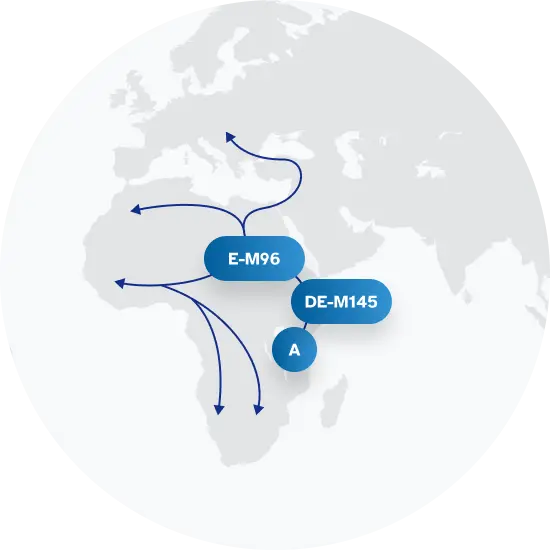Explore the Family Name Wolf
How common is the last name Wolf in the United States?
According to the Decennial U.S. Census, the surname "Wolf" has seen a slight dip in popularity rankings from 2000 to 2010. In 2000, it was ranked as the 427th most popular surname, but by 2010, it had slipped to the 474th position, marking an 11.01% decrease. Despite this drop in rank, the actual count of people with the surname "Wolf" increased by 1.63%, going from 68,905 in 2000 to 70,031 in 2010. This indicates that although its rank may have dropped, the surname's prevalence in the population remained relatively stable.
| 2000 | 2010 | Change | |
|---|---|---|---|
| Rank | #427 | #474 | -11.01% |
| Count | 68,905 | 70,031 | 1.63% |
| Proportion per 100k | 25.54 | 23.74 | -7.05% |
Race and Ethnicity of people with the last name Wolf
In terms of ethnicity, the Decennial U.S. Census data shows some shifts in the distribution among those bearing the surname "Wolf". The percentage identifying as White decreased slightly from 94.96% in 2000 to 93.67% in 2010. However, the representation of Hispanic individuals with this surname saw the highest increase, rising from 1.40% in 2000 to 2.16% in 2010, a growth of 54.29%. Meanwhile, individuals identifying as Asian/Pacific Islander and those belonging to two or more races both saw increases of over 25%. The percentages of Black individuals and American Indian and Alaskan Native individuals with the surname "Wolf" also rose, but at smaller rates of 2.88% and 8.25% respectively.
| 2000 | 2010 | Change | |
|---|---|---|---|
| White | 94.96% | 93.67% | -1.36% |
| Hispanic | 1.4% | 2.16% | 54.29% |
| Two or More Races | 1.15% | 1.46% | 26.96% |
| Black | 1.04% | 1.07% | 2.88% |
| American Indian and Alaskan Native | 0.97% | 1.05% | 8.25% |
| Asian/Pacific Islander | 0.48% | 0.61% | 27.08% |
Wolf ancestry composition
23andMe computes an ancestry breakdown for each customer. People may have ancestry from just one population or they may have ancestry from several populations. The most commonly-observed ancestry found in people with the surname Wolf is French & German, which comprises 34.3% of all ancestry found in people with the surname. The next two most common ancestries are British & Irish (31.3%) and Ashkenazi Jewish (12.6%). Additional ancestries include Eastern European, Scandinavian, Italian, Spanish & Portuguese, and Indigenous American.
Ready to learn more about your ancestry? Get the most comprehensive ancestry breakdown on the market by taking our DNA test. Shop 23andMe
| ANCESTRY BREAKDOWN | COMPOSITION |
|---|---|
| French & German | 34.3% |
| British & Irish | 31.3% |
| Ashkenazi Jewish | 12.6% |
| Other | 21.9% |

Possible origins of the surname Wolf
Your DNA provides clues about where your recent ancestors may have lived. Having many distant relatives in the same location suggests that you may all share common ancestry there. Locations with many distant relatives can also be places where people have migrated recently, such as large cities. If a large number of individuals who share your surname have distant relatives in a specific area, it could indicate a connection between your surname and that location, stemming from either recent ancestral ties or migration.
Based on 23andMe data, people with last name Wolf have recent ancestry locations in the United Kingdom of Great Britain and Northern Ireland and Ireland.
| RECENT ANCESTRY Location | Percentage |
|---|---|
| Greater London, United Kingdom | 67.90% |
| Merseyside, United Kingdom | 67.60% |
| Greater Manchester, United Kingdom | 67.60% |
| Glasgow City, United Kingdom | 67.40% |
| West Midlands, United Kingdom | 67.30% |
What Wolf haplogroups can tell you
Haplogroups are genetic population groups that share a common ancestor on either your paternal or maternal line. These paternal and maternal haplogroups shed light on your genetic ancestry and help tell the story of your family.
The top paternal haplogroup of people with the surname Wolf is E-V13, which is predominantly found among people with European ancestry. Haplogroup E-V13 is descended from haplogroup E-M96. Other common haplogroups include R-U152 and R-P311, which are predominantly found among people with European and European ancestry. Other surnames with similar common haplogroups are: Hoffman, Schmidt, Klein, Wagner, Fischer, Becker, Schneider, Bauer, Miller, Mueller.
The most common maternal haplogroups of people with Wolf surname are: H1, T2b, H. These most commonly trace back to individuals of European ancestry.
 Paternal Haplogroup Origins E-M96
Paternal Haplogroup Origins E-M96
Your paternal lineage may be linked to early Balkan migrants
Haplogroup E1b1b1a1b1a migrated in large numbers from the Balkans into Europe about 4,500 years ago, triggered by the beginning of the Balkan Bronze Age. During this migration, members of haplogroup E1b1b1a1b1a mainly followed rivers connecting the southern Balkans to northern-central Europe. Technological leaps often cause lineages to grow dramatically in numbers and in geographic range. The development of Bronze technology may have given men in haplogroup E1b1b1a1b1a a competitive advantage over other men, causing haplogroup E1b1b1a1b1a to proliferate and become widespread.
Your maternal lineage may be linked to Marie Antoinette
Because it is so dominant in the general European population, haplogroup H also appears quite frequently in the continent's royal houses. Marie Antoinette, an Austrian Hapsburg who married into the French royal family, inherited the haplogroup from her maternal ancestors. So did Prince Philip, Duke of Edinburgh, whose recorded genealogy traces his female line to Bavaria. Scientists also discovered that famed 16th century astronomer Nicolaus Copernicus traced his maternal lineages to haplogroup H.

What do people with the surname Wolf have in common?
Spoiler alert: it's complicated. People with the same last name are usually no more genetically similar than a randomly sampled group of people from the same population. That said, people with the same surname are more likely to have similar ancestries than randomly sampled individuals. The reason is the tendency of people with similar cultural or geographical backgrounds to preferentially mate with one another. That's why people who share a surname may be more likely to share traits and tendencies in common than people within the general population. Check out the percentages below to see the prevalences of tastes, habits, and traits of people with your surname compared with prevalences among 23andMe users.
Preferences
Traits
Habits
Wellness
Are health conditions linked to the last name Wolf?
The short answer is that, if there is an association between surname and health, it's usually more about your ancestry than your name. Individuals with a given surname are no more genetically similar than the general population but often have similar ancestries. The populations of people associated with those shared ancestries often have sets of genetic variations, also known as alleles, in common. Some of those alleles are associated with a greater likelihood of developing certain diseases.
Disease variant frequency by ancestry
Disease allele frequencies in populations associated with the surname Wolf are shown below. Important Note: not everyone with a disease allele will develop these health condition




























